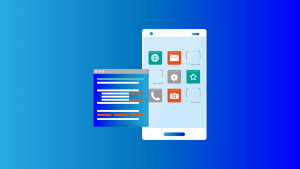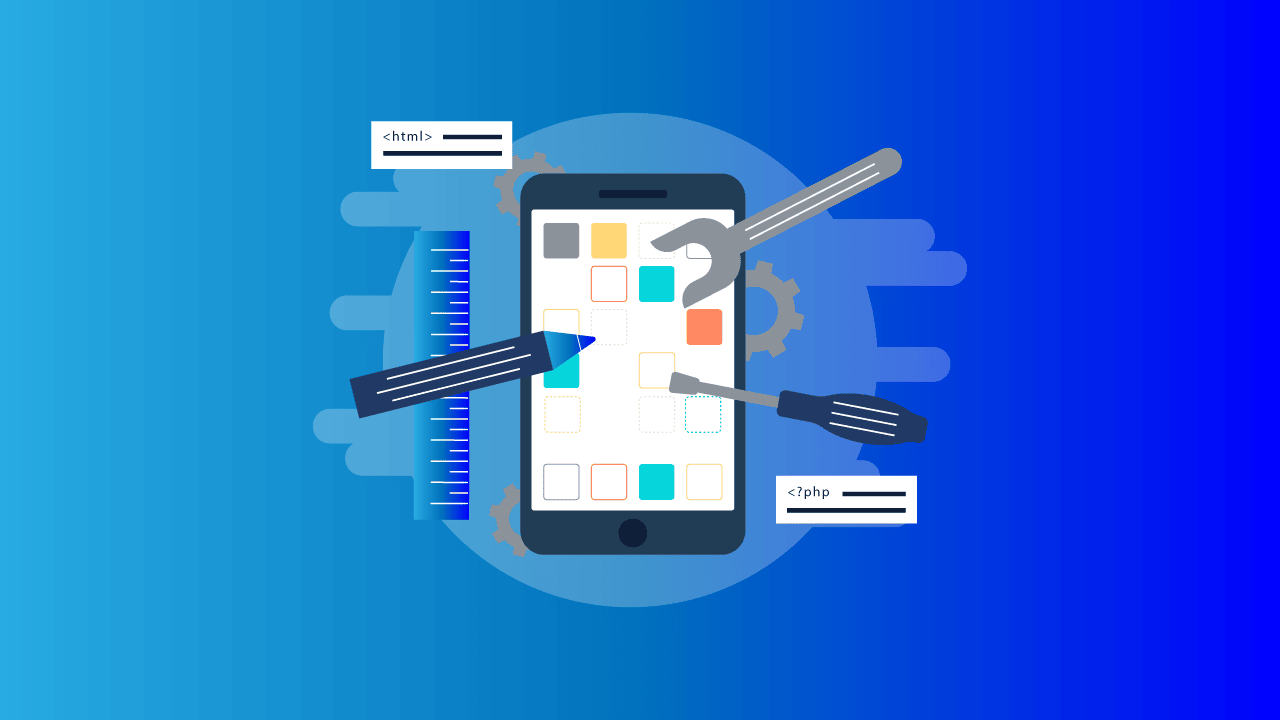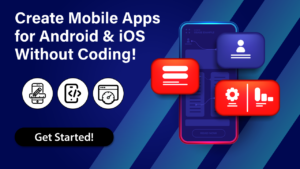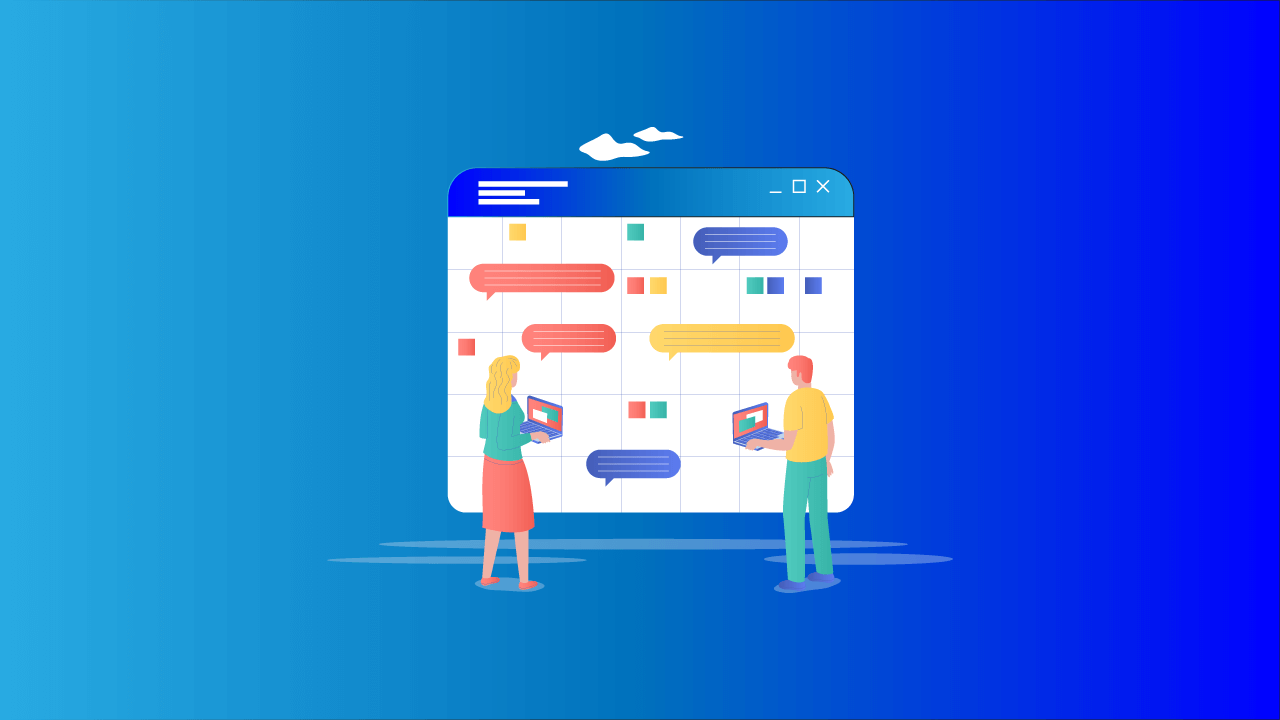App builders, also known as app development platforms, are software tools that enable individuals and organizations to create mobile applications without extensive coding knowledge. App builders provide a user-friendly interface allowing users to design, develop, test, and deploy apps for platforms such as iOS, Android, and the web. These platforms often provide pre-built templates, drag-and-drop interfaces, and other tools that simplify the app development. App builders aim to make app development accessible to a wider audience, enabling them to create functional, user-friendly, and engaging mobile apps quickly and easily.
Brief History Of App Builders
App builders have evolved, starting with early examples that relied on basic coding skills and progressing to more sophisticated platforms that use drag-and-drop interfaces and artificial intelligence.
In the early days of app development, individuals and organizations relied on coding skills to develop mobile applications. This process was time-consuming, required high technical expertise, and was often expensive. Early app builders emerged in the late 1990s and early 2000s, providing a simple graphical interface to create basic apps. However, these early app builders were limited in functionality and design capabilities.

As mobile devices became more prevalent, app builders evolved to meet the growing demand for mobile applications. The first drag-and-drop app builders emerged in the mid-2000s, making app development more accessible to non-technical users. These platforms allowed users to create apps by dragging and dropping pre-built components into a visual editor without extensive coding knowledge.
In the early 2010s, low-code app development platforms emerged, offering more advanced tools and capabilities. These platforms allowed users to create complex apps using visual components and code, enabling faster development cycles and more robust functionality.
More recently, no-code app development platforms have emerged, providing an even simpler and more intuitive interface for creating mobile applications. These platforms allow users to create apps without writing a single line of code, using pre-built components, templates, and visual editors. Mobiroller is also a no- code app developer since it was built in 2012, one of the first no-code mobile app builders in the world.
Today, app builders continue to evolve, with the Emergence of AI-powered app development platforms that use machine learning and natural language processing to automate certain aspects of app development. The evolution of app builders has made it easier and more affordable for individuals and organizations to create mobile applications, democratizing the app development process and enabling greater innovation in the mobile app industry.
Rise Of Drag-And-Drop App Builders

1. Emergence of drag-and-drop app builders
Drag-and-drop app builders emerged in the mid-2000s, providing a simpler and more accessible way to develop mobile applications. These platforms allow users to create apps by dragging and dropping pre-built components into a visual editor without extensive coding knowledge. This made app development more accessible to non-technical users, enabling them to create basic mobile applications quickly and easily.
2. Advantages of drag-and-drop app builders
The main advantages of drag-and-drop app builders are their ease of use and accessibility. With a drag-and-drop interface, users can create mobile applications without needing to learn a programming language or hire a developer. This makes app development more affordable and democratizes the process, enabling a wider range of individuals and organizations to create mobile applications.
Drag-and-drop app builders also allow faster development cycles, as users can create and test app designs in real time without manual coding. This makes it easier to iterate and refine app designs, leading to better user experiences.
3. Popular drag-and-drop app builders
There are several popular drag-and-drop app builders on the market, including:
AppMaker: AppMaker is a drag-and-drop app builder that focuses on creating mobile applications for media and publishing companies. It provides a range of pre-built templates and drag-and-drop components and integration with popular content management systems like WordPress.
Low-Code App Development Platforms

1. Emergence of low-code app development platforms
Low-code app development platforms emerged in the early 2010s, offering more advanced tools and capabilities than drag-and-drop app builders. These platforms allowed users to create complex mobile applications using a combination of visual components and code, enabling faster development cycles and more robust functionality. Low-code platforms require less coding than traditional app development, enabling non-technical users to build more advanced apps with less effort.
2. Advantages of low-code app development platforms
Low-code app development platforms provide several advantages over traditional coding, including:
- Faster development cycles: With a low-code platform, users can create and test app designs more quickly, enabling faster development cycles and time-to-market.
- More advanced functionality: Low-code platforms allow users to create more advanced functionality than drag-and-drop app builders, including integrating third-party APIs and databases.
- Less reliance on developers: Low-code platforms enable non-technical users to create more advanced mobile applications without relying on developers, reducing costs and enabling greater flexibility.
3. Popular low-code app development platforms
There are several popular low-code app development platforms on the market, including:
- Microsoft PowerApps: Microsoft PowerApps is a low-code app development platform that allows users to create mobile applications for iOS, Android, and the web. It provides a range of pre-built templates, drag-and-drop components, and integration with Microsoft Azure services.
- Mendix: Mendix is a low-code app development platform that provides various tools for creating and deploying mobile applications. It includes pre-built templates, drag-and-drop components, and the ability to customize and extend app functionality with code.
- OutSystems: OutSystems is a low-code app development platform that enables users to create and deploy mobile applications for various platforms, including iOS, Android, and the web. It provides a range of pre-built templates and drag-and-drop components and integration with a range of third-party services.
No-Code App Development Platforms

1. Emergence of no-code app development platforms
No-code app development platforms emerged in the mid-2010s, offering an even simpler and more accessible approach to app development than drag-and-drop and low-code platforms. These platforms enable users to create mobile applications without coding or technical knowledge, using various pre-built templates and components.
2. Advantages of no-code app development platforms
The main advantages of no-code app development platforms are their ease of use and accessibility. With a no-code platform, users can create mobile applications without needing to learn a programming language or hire a developer, further democratizing app development.
No-code platforms also provide faster development cycles, as users can create and test app designs in real time without manual coding. This makes it easier to iterate and refine app designs, leading to better user experiences.
3. Popular no-code app development platforms
There are several popular no-code app development platforms on the market, including:
- Bubble: Bubble is a no-code app development platform that enables users to create mobile applications using a drag-and-drop interface. It provides a range of pre-built components and integration with various third-party services.
- Glide: Glide is a no-code app development platform specializing in creating business mobile applications. It enables users to create mobile applications from Google Sheets, with various pre-built templates and customization options.
- Mobiroller: Mobiroller is a no-code app development platform enabling users to create mobile applications without coding or technical knowledge. It provides a range of pre-built templates and components and the ability to add custom code.
Ai-Powered App Builders

1. Emergence of AI-powered app builders
AI-powered app builders have emerged in the last few years, leveraging the power of machine learning and other AI techniques to automate many aspects of app development. These platforms use AI algorithms to generate code, design interfaces, and optimize app performance, enabling faster development cycles and more advanced functionality than previous app development platforms.
2. Advantages of AI-powered app builders
AI-powered app builders provide several advantages over traditional app development platforms, including:
- Faster development cycles: With AI-powered app builders, users can create and test app designs more quickly, enabling faster development cycles and time-to-market.
- More advanced functionality: AI-powered app builders use machine learning algorithms to optimize app performance and provide advanced functionality, such as natural language processing and computer vision.
- Reduced costs: AI-powered app builders reduce the need for manual coding and design work, enabling users to create mobile applications with minimal effort and technical knowledge. This reduces costs and enables greater flexibility in app development.
3. Popular AI-powered app builders
There are several popular AI-powered app builders on the market, including:
- AppSheet: AppSheet is an AI-powered app builder that uses machine learning algorithms to generate app functionality and optimize performance. It provides a range of pre-built templates and components and customization options for advanced users.
- Botsociety: Botsociety is an AI-powered app builder specializing in creating conversational interfaces for mobile applications. It uses natural language processing and machine learning algorithms to optimize bot performance and provide advanced functionality.
- Sketch2Code: Sketch2Code is an AI-powered app builder that converts hand-drawn sketches into functional mobile applications. It uses computer vision algorithms to analyze sketches and generate code, enabling faster app development cycles and more advanced functionality.
AI-powered app builders represent the latest evolution in app development technology, enabling even faster development cycles and more advanced functionality than previous platforms.
Future Of App Builders

- Continued Evolution Of Ai-Powered App Builders
AI-powered app builders are likely to continue evolving in the coming years with even more advanced functionality and automation. This could include using advanced machine learning algorithms, natural language processing, and computer vision to further automate the app development and enable even more advanced functionality.
- Greater Integration With Other Technologies
App builders will likely integrate more with emerging technologies like blockchain and the Internet of Things (IoT). This could enable the creation of mobile applications that leverage these technologies, such as decentralized apps (dApps) or IoT-enabled mobile applications.
- Increased Focus On User Experience
As the mobile app market becomes more crowded, app builders will likely emphasize user experience more. This could include using AI algorithms to optimize app design and functionality and more advanced tools for A/B testing and user feedback.
- Greater Democratization Of App Development
App builders will likely become even more accessible and easy to use, enabling a wider range of individuals and organizations to create mobile applications with minimal effort and technical knowledge. This could lead to a greater diversity of mobile applications and a more level playing field for smaller developers and startups.
QUESTIONS AND ANSWERS
Q1. What Makes Mobiroller A Good Choice For Creating An App?
A1. Mobiroller is an excellent choice for anyone looking to create an app without coding skills. It has a simple drag-and-drop interface and an extensive library of templates and components, making it easy to customize your app quickly and easily. Plus, it also offers a range of advanced features such as analytics, push notifications, and monetization tools.
Q2. Does Mobiroller Have An Additional Cost?
A2. No, Mobiroller does not have any additional cost. It has a free version with basic features and a paid plan that gives you access to all the features. The paid plans are affordable, and you can choose from different packages based on your requirements.
Q3. Is Mobiroller Easy To Use?
A3. Yes, Mobiroller is easy to use, even for those without coding experience. It has a simple drag-and-drop interface that makes it easy to customize your app in minutes. Plus, it offers many templates and components to make your app look professional.
Q4. Does Mobiroller Offer Support?
A4. Yes, Mobiroller offers 24/7 customer support via phone, email, and live chat. The support team is knowledgeable and always happy to help. In addition, there is also a comprehensive Help Center that contains useful information and tutorials on how to use Mobiroller.
Q5. What Features Does Mobiroller Have?
A5. Mobiroller has many features, such as analytics, push notifications, monetization tools, and more. It also offers advanced features such as A/B testing and user feedback. With Mobiroller, you can create a professional-looking app in no time.
Q6. Is Mobiroller Secure?
A6. Yes, Mobiroller is highly secure and takes measures to ensure the security of your data. All data is stored securely in an encrypted database, and all communications are secured with SSL encryption. It also has other security measures such as two-factor authentication, app monitoring, and regular backups.
CONCLUSION
AI-powered app builder represent the latest evolution in mobile app development technology, enabling users to create and test apps more quickly and easily. With continued advances in AI algorithms and increased integration with other technologies, these platforms will likely become even more powerful and versatile in the coming years. This could lead to a greater democratization of app development, enabling a wider range of individuals and organizations to create innovative mobile applications. Ultimately, AI-powered app builders have the potential to transform the way mobile apps are created and used around the world. But if you want to make your app with no code app development platform with little money, you can Try Mobiroller. Mobiroller is the perfect choice for anyone looking to create an app without coding skills! Try it today!





